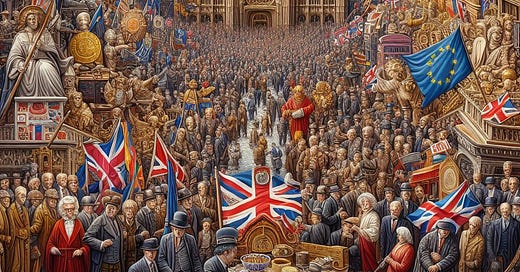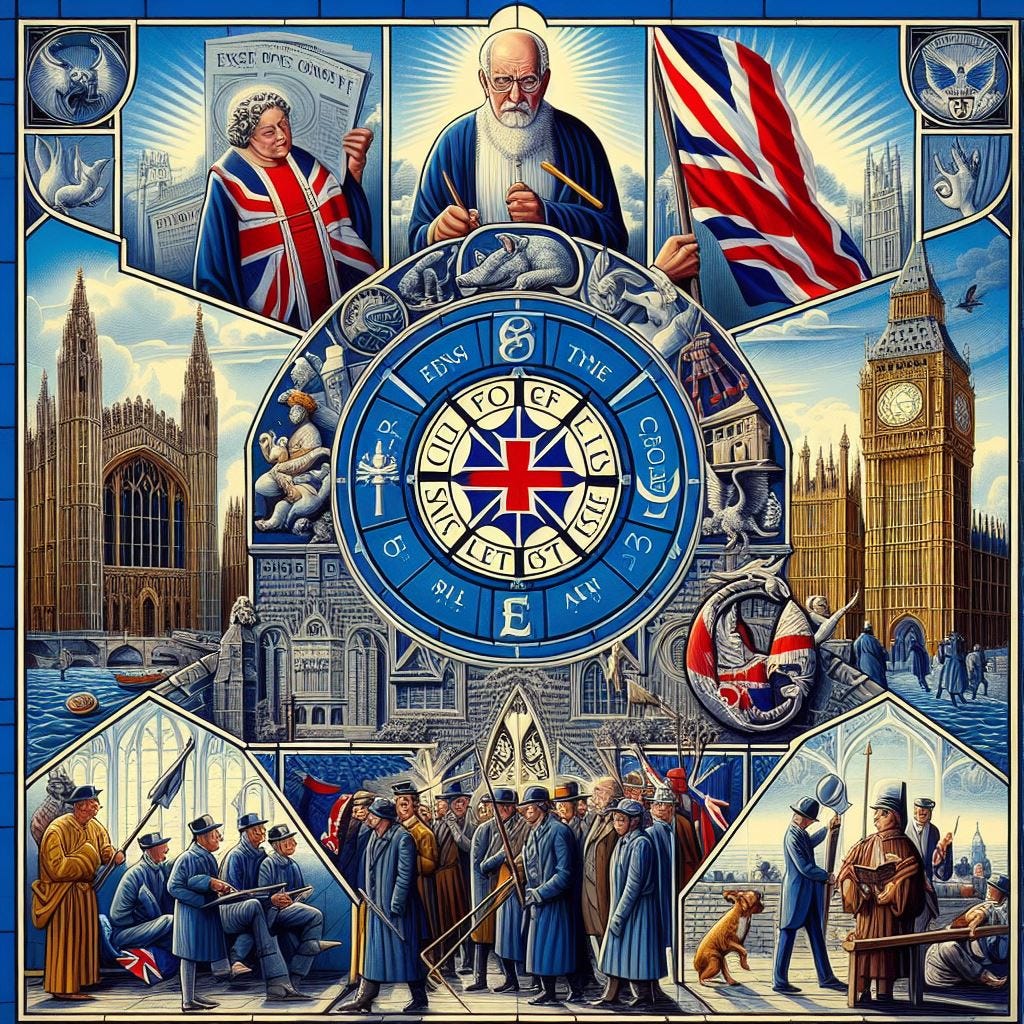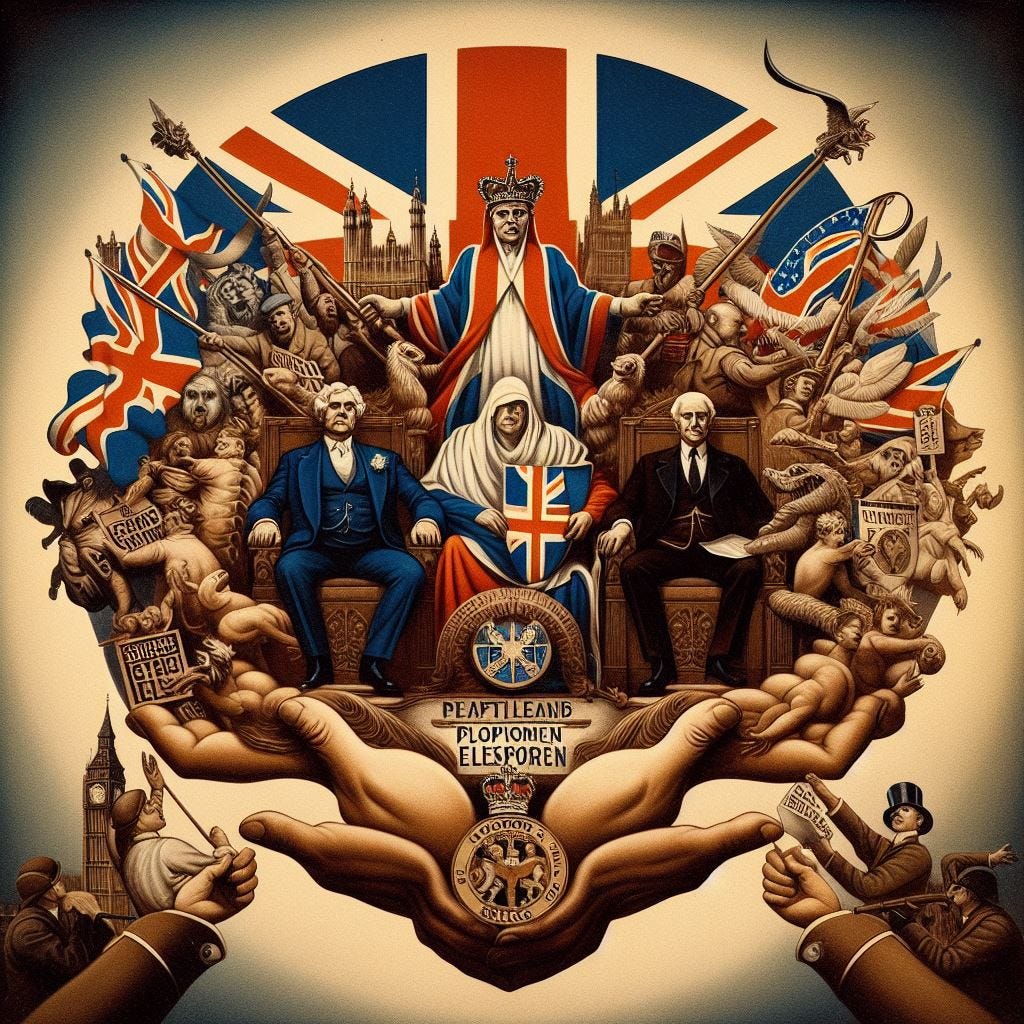Tories and Whigs
Are there any values that can cut across party lines? It's time to take The Sniff Test.
Our Political Polarisation
Could you be a member of the far right?
It’s not what they call you but what you respond to, or so I remind my daughters. But sometimes a name becomes a badge of honour. Like the N word that only N people can say. Or Tory.
If you follow the BBC, The Guardian, CNN and The New York Times, you are forgiven for believing the far right is everywhere. The definition in the media is anyone opposed to diluting national identities, global leadership by special interests and environmental policies. Another name is Tory.
Andy Beckett penned a Guardian polemic concluding that the centre-right think tank Onward was in fact extremist. Beckett’s definition of extremist is every one else in the Conservative party. Onward’s crime was to want a tougher approach to tackling crime and to defend national cultural norms.
The polarisation of political debate means labelling people as for you or against. You only have to err on a single issue to be treated as the enemy. Onward has a policy for practical and popular decarbonisation. But its other thought crimes are enough to earn the extremist label.
Polarisation disregards the lessons of the past. The UK parliamentary parties survive by adaption, but slowly. Brexit was a jolt in 2016, but it was brewing for years and may take as long to deliver. The Conservative Party is modern democracy’s most successful election winning machine because it changes.
So what does it mean to be Tory?
The Good Doctor
I recently attended Anne’s funeral. She was a lovely lady and grandmother to my godson who was born just over a decade ago. Walking through the ancient splendour of Edinburgh, I was taken back to his christening when I sat next to her at lunch. She turned and said,
I hope you’re not one of those Tories. We don’t have much call for them up here.
This was a statement of fact. The Conservatives won only one seat in the 2014 election. They have seven of the 59 Scottish seats at Westminster today and the best result ever was 11 in 1983.
This was also a use of Tory as pejorative. But the name has always been a term of abuse and allegiance. Dr Johnson defined it in 1755 as,
[A cant term, derived, I suppose, from an Irish word signifying a savage.] One who adheres to the ancient constitution of the state, and the apostolical hierarchy of the Church of England.
The good doctor revealed his allegiance through his miserly definition of Whig,
A member of a faction.
Nowadays both Tory and Whig hole up in the Conservative party, although the liberal values associated with Whiggery occur in others. What binds them is the same as for many political parties formed from coalitions of interests, which is opposition to something else. In the case of Conservatives that is socialism. But while the traditional use of Whig has lapsed, Tory persists. It means something different within the Conservative Party to what it means outside.
One Nation’s Divide
Sky News attempted this week to define the factions of the Conservative Party. What it did not do was make the members of each of the six groupings add up to the party’s 349 MPs. Politicians are part of several groups, although there is a clear divide. The use of Tory in the media completely misses this distinction.
The most centrist group is the One Nation caucus which launched in 1975 and claims over 100 MPs. These are the inheritors of the Unionist tradition, which came to the Conservatives in the merger with the short-lived Liberal Unionist Party in 1912. This group is most closely identified with Toryism.
Leaving aside vague concepts such as democratic renewal and law and order (who’s against that?), the caucus stands for global leadership, equality of opportunity, strong public services, local politics, the primacy of markets and environmental stewardship. Its members are generally pro the European Union.
In contrast to One Nation, Liz Truss recently launched Popular Conservatism, dubbed PopCon in the media. The movement aims to wrest back control of people’s lives from judges, quangos and international human rights organisations. It stands for stronger immigration controls, lower taxes and an end to “Net Zero zealotry”. When the left leaning media rails against the Tories these are the policies it usually derides. It’s interesting therefore that Truss and her supporters believe a new movement is required to make them Conservative policies. Tories don’t generally believe in these things.
The PopCons may also be members of the European Reform Group. This rose to prominence backing Brexit but is relatively quiet today. The mantle of immigration control passed to the New Conservatives, a term for the 25 MPs from beyond the Red Wall. This is a region of northern England assumed to vote Labour and whose support sprung the surprise victory of Boris Johnson in 2019.
The widespread expectation is that the New Conservatives will be gone from parliament after this year’s election. This may shift the focus back to the Northern Research Group, which currently numbers 55 MPs. This holds an annual conference and favours lower business taxes, devolution and investment in transport and other infrastructure.
The Common Sense Group of around 50 MPs stands for authentic conservatism. I assume this means whatever its members choose to stand for. The group claims to represent people against the elite and fights the culture wars in favour of families.
The Conservative Growth Group completes the factions and has around 20 members. But as Truss is one of them, her new movement suggests this group is redundant.
It’s easy to see why outsiders don’t take time to understand the intricacies of being Conservative. It’s much simpler to label everyone Tory and define that by whatever Conservative policy gets your goat. One man in particular illustrates the problem of pinning a Tory down.
Holly and Jacob
Jacob-Rees Mogg looks like a textbook Tory. He is a member of the establishment elite, a believer in the virtue of public service and a Catholic. He reeks of old Tory. But he is part of the Truss faction as well as the leadership choice of astute political commentator Holly Valence.
Holly Valance comes out as a massive Tory and wants Jacob Rees-Mogg for PM - Metro
I do like the idea that you must now come out as Tory.
Rees-Mogg is associated with the burn-it-down Whiggery of which Michael Gove is an exemplar. Brexit is a case in point. A Whigamore was a Scottish Presbyterian known for rioting against the established Church. As noted, terms of abuse may be adopted by the accused.
Who then is a real Tory?
The Stewart Rebellion
Rory Stewart, podcaster, politician and frontrunner to be the next Chancellor of Oxford University, makes a defence of Toryism. His views on faith, local community and family ties are in common with values that I believe Anne held. But Stewart joined the Conservatives as they’re not socialists, not because he is aligned with all they stand for.
Other Tory values include individual responsibility and engagement in public life. They believe in local solutions and a focus on public service over personal ambition. Stewart’s book “Politics on the Edge” contains a call for reform. This echoes David Cameron’s 2009 speech against careerist politicians during the expenses scandal. Stewart wants independent scrutiny of policies.
Exactly how this would work is not explained, but Stewart notes the importance of the National Audit Office and of Parliamentary Select Committees. There is mention of expert panels and commissions, along with public hearings, consultations and citizen juries. Lest this sound old-fashioned, there is also a role for data analysis in determining the effectiveness of policies.
Imagine that, figuring out if policies worked, rather than passing them on principle and focusing on the next election.
The problem with Stewart’s rallying cry is that popular participation is often highest in times of strife. The Brexit vote passed because the great unwashed came out to vote. As
points out in his recent essay “How to Overcome”, almost three-quarters of the poorest people in Britain typically don’t vote.Politicians rely on the fire of fervour dying out. Push issues into committee, launch an investigation, hold an enquiry and hopefully people will lose interest. Then it’s back to business as usual.
“Cider with Rosie” is a wistful book about a lost England. It is the most famous of Laurie Lee’s trilogy recalling a country childhood after the First World War. The motor car and other technological changes had transformed Lee’s world by the time of publication in 1959. Tory values can also appear to yearn for a past that is no longer possible.
The geopolitician George Friedman argues that the age of experts, in place since World War II, is coming to an end. For Friedman, the response to Covid was the epitome of the failure of experts. The medical ones could only see the contagion, the economists the costs and the statisticians the noise. An effective response required a generalist leader to collate and choose among the advice. Instead our politicians hid behind the experts and carried on as normal.
Here is the opportunity for a Tory revival. This is a ground up, local and community solution to many of the issues that people care about today. Ben Hunt’s “Make, Protect, Teach” call to arms at Epsilon Theory in the US shares many of the same sentiments. So too does Michael Taylor, who is an avowed Social Democrat.
Michael believes the centre to be rotten and corrupt and he explains why. The London elite act as imperialists even though the United Kingdom is the last remaining piece of empire. But unlike the imperialists of old, from Romans to Britons, there is no longer elite training in the provinces. One of Michael’s requirements is that politicians and administrators alike should prove themselves by solving regional problems before being awarded national office.
To the Provinces
Anne told me the story of how her forefathers crossed from Ireland to find work. They were spat on and spurned as they trudged eastwards to Edinburgh. There they found jobs in coal mining and manufacturing. Those jobs are gone.
At the time I thought of Norman Tebbit’s tale of his father cycling to find work during the 1930s depression. The media twisted this as Tebbit telling the unemployed of the ‘80s to do the same and labelled him “Onyerbike”. Tebbit was Margaret Thatcher’s trusted lieutenant and almost as derided north of the border as she is.
If the Irish were prepared to move country to find work, why wouldn’t their descendants do the same? This goes to the heart of the Scottish disdain for Tories. Getting on yer bike was not the deal.
The north accepted that international competition put paid to traditional industrial employment. But it wanted an alternative. This required retraining, investment and new infrastructure. It never came.
This is the betrayal – not the pit closures but the aftermath. Any hope of redemption through Labour disappeared with Blair and Brown’s prescriptions for public spending. These enshrined the need to maximise return on investment. A cold calculus almost always favours London and the South East due to population density.
The metropolitan elites control both leading parties. They offer weasel words for votes and deliver inaction. Levelling up is the latest in a long line of London claptrap. The Red Wall will be rebuilt, but more from despair than hope that a London human rights lawyer will change anything.
It’s become a canon of The Sniff Test that the 2030s will see Millennial leaders introduce change that is unimaginable today. For those of us who have lived long lives in the age of experts, it is near impossible to see what this means. But if we want to play a part in renewal we must embrace the values that cut across party lines.
To the provinces then.








Very interesting article thank you
https://youtu.be/8J3Wp_xMliI?si=ED_H-BqBZvGP4DfX
I didn’t try to show Anne (or Robert) this documentary as the short shrift it would have received would likely result in rather more damaging consequences
But the points made are valid. Thatcher was not a conservative in the traditional sense. She didn’t believe in the uniparty taking turns to manage the “family silver” as Harold McMillan put it and did believe in individual responsibility creating a better society with a much smaller government
Whether or not she succeeded is open to discussion . But she was hated more by the Tory hierarchy than the left who couldn’t abide the idea of the individual having a measure of control over their own lives and consequently hammered at the cost to reset to the neo liberal free market of the 1980s and 1990s
34 years after Thatcher’s political fall, and we find ourselves in post 2008 financial injury time for the globalist neo liberal economic model, and the same people still cannot accept that change is necessary and with it comes a hefty cost. After over a decade of debauched QE free money abuse to prop up the failing Western financial system and sovereign debts that fewer want to own, what else do they expect ?
Away from the confected faux rage on display at the Westminster theatre, I have hope via the story about two fierce political opponents who used to meet up regularly but secretly over glasses of whisky for frank & blunt discussions about politics and improving society When he died in 1991, standing next to his wife at the funeral was she in tears mourning an opponent she respected
Their names ? Margaret Thatcher and Eric Heffer